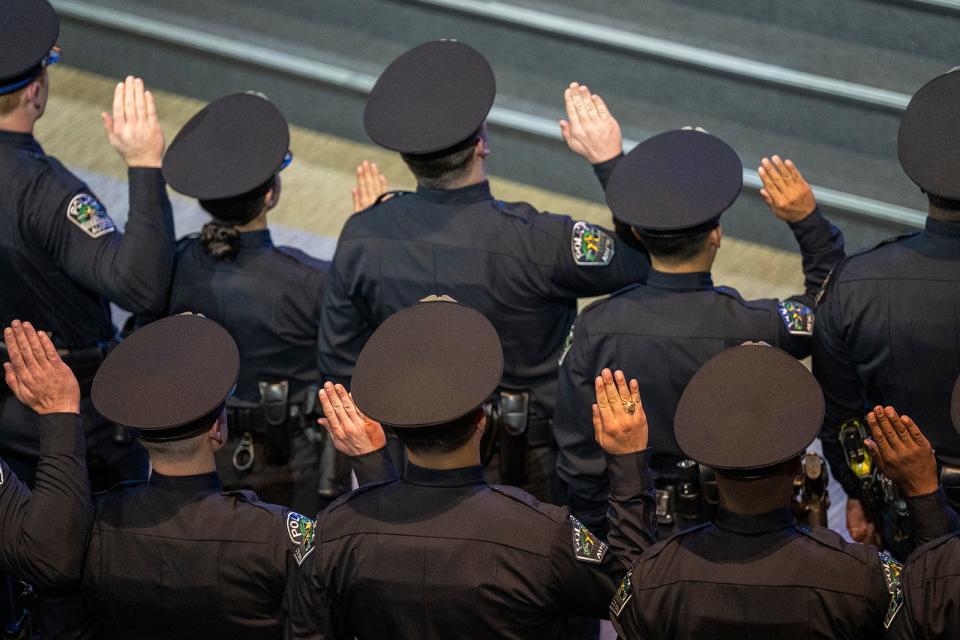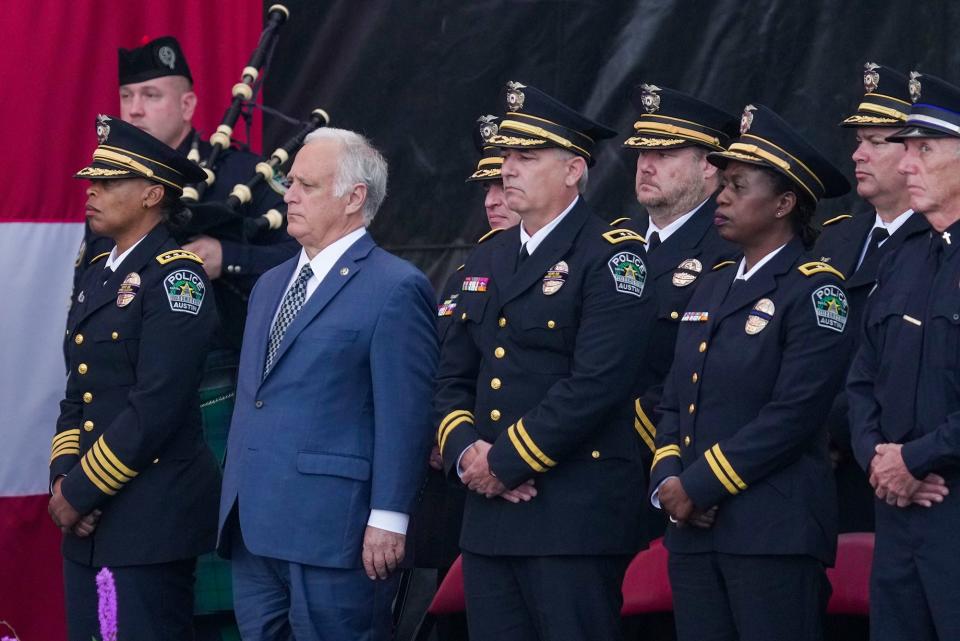AG Ken Paxton sues Austin, other Texas cities over lax marijuana possession ordinances
- Oops!Something went wrong.Please try again later.
Attorney General Ken Paxton is suing five Texas cities, including Austin, over ordinances that flout state drug laws and prevent police from arresting people found with marijuana, according to a lawsuit filed Wednesday.
In the suit filed in Travis County state District Court, the attorney general's office argues that "non-prosecution" policies in Austin, San Marcos, Elgin, Killeen and Denton violate the state's government code, and that the local measures to lessen penalties for marijuana possession are unconstitutional.
“I will not stand idly by as cities run by pro-crime extremists deliberately violate Texas law and promote the use of illicit drugs that harm our communities,” Paxton said in a statement announcing the lawsuit.

Naming the Austin City Council and Mayor Kirk Watson as defendants in the suit, Paxton is asking the District Court to temporarily pause local rules eliminating marijuana possession enforcement, which have been in effect since 2022, and to ultimately repeal the decriminalization law.
Currently, the Austin Police Department's policy in handling cases of misdemeanor-level marijuana possession is to confiscate the drugs, write a report on the encounter and release the individual if marijuana possession is the only infraction.
In 2022, 85% of Austin voters approved a measure prohibiting the city's police from enforcing marijuana laws in cases involving small amounts of the drug.
“We are aware of the lawsuit challenging Austin’s policies related to low-level possession of marijuana," a city of Austin spokesperson told the American-Statesman in an email Thursday. "This 2024 lawsuit is related to a 2022 voter-approved initiative petition.”
The other cities named in the lawsuit passed marijuana ordinances in 2022 as well, including in San Marcos, with nearly 82% voter approval. In Bastrop County, voters in Elgin supported such a change with 74% of the vote. Killeen residents approved their proposition with 69% support, and in Denton, such a measure passed with 71% of voters in favor.
“We are aware of the Attorney General’s lawsuit and subsequent news release, but do not comment on pending litigation,” said city of Denton chief communications officer Dustin Sternbeck.
The cities of San Marcos, Killeen and Elgin declined to comment on the lawsuit Thursday.
Julie Oliver, executive director of Ground Game Texas, a nonprofit that led the marijuana ballot initiative in Austin and other Texas cities, chastised Paxton for bringing the suit against the popular city ordinances.
“Ken Paxton’s lawsuits represent an anti-democratic assault on the constitutional authority of Texas Home Rule cities to set local law enforcement priorities," Oliver said in a statement Wednesday. "In each of the cities sued, a supermajority of voters adopted a policy to deprioritize marijuana enforcement in order to reduce racially-biased law enforcement outcomes and save scarce public resources for higher priority public safety needs."

The Texas Health and Safety code currently lists a number of penalties for marijuana possession, ranging from a Class B misdemeanor for possessing 2 ounces or less and up to a first-degree felony with a minimum five-year prison term and a potential fine up to $50,000 for possessing 20,000 pounds or more.
The attorney general's office wants the District Court to issue a ruling compelling those cities to enforce the state's drug laws, ensure city employees are not punished for enforcing those laws and require city policymakers to return operating procedures to pre-decriminalization status.

“This unconstitutional action by municipalities demonstrates why Texas must have a law to ‘follow the law,'" Paxton said. "It’s quite simple: the Legislature passes every law after a full debate on the issues, and we don’t allow cities the ability to create anarchy by picking and choosing the laws they enforce.”
Paxton's latest lawsuit mirrors a law the Republican-led Texas Legislature passed to further limit local governments' ability to craft policies inconsistent with state law under eight codes: Agriculture, Business & Commerce, Finance, Insurance, Labor, Natural Resources, Occupation and Property.
Opponents of House Bill 2127 have argued that the legislation is an attempt to claw back larger and primarily Democratic cities' ability to supersede Texas law through municipal ordinances.
Soon after Gov. Greg Abbott signed HB 2127 — often called the "Death Star" bill — into law in June, it became entangled in the courts after several cities filed a challenge. The matter has not yet been finally adjudicated.
This article originally appeared on Austin American-Statesman: AG Ken Paxton sues Austin, other Texas cities over lax marijuana rules

